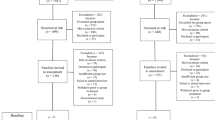Abstract
A procedure to enhance the impact of parent training with multistressed mother — child dyads was explored with 29 clinic-referred dyads. The procedure, called synthesis teaching, was provided for one randomly selected group of dyads, while the other group was engaged in problem discussions about their children. Both groups received parent training as the principal intervention for the mothers' conduct-disordered children. Results showed that these interventions had no effects on dyads in the clinic setting, but had a progressively more significant effect at home for the synthesis teaching group. That is, mothers in this group showed reductions in their indiscriminate parenting and their children demonstrated behavioral improvements. In contrast, mothers in the control group did not change their behavior and their children did not demonstrate observed behavioral changes. Interpretations of the results center on how synthesis teaching might have produced these effects.
Similar content being viewed by others
References
Achenbach, T. M., & Edlebrock, C. S. (1981). Behavioral problems and competencies reported by parents of normal and disturbed children aged 4 through 16.Monographs of the Society for Research in Child Development, 46 (1, Serial No. 188).
Beck, A. T., Steer, R. A., & Garbin, M. G. (1988). Psychometric properties of the Beck Depression Inventory: Twenty-five years of evaluation.Clinical Psychology Review, 8, 77–100.
Cartor, P. G., Bond, D., Crabb, B., & Wahler, R. G. (1987).Synthesis teaching: A coding manual for the analysis of parent-therapist conversations. Unpublished manuscript, The University of Tennessee, Knoxville.
Cerezo, A. (1988). Standardized observation codes. In M. Herson & A. Bellack (Eds.),Dictionary of behavioral assessment techniques (pp. 442–444). New York: Pergamon Press.
Cerezo, A., Keesler, T. Y., Dunn, E. S., & Wahler, R. G. (1986).Standardized observation codes: Revision III-B. Unpublished document, Psychology Department, University of Tennessee, Knoxville.
Dumas, J. E., & Wahler, R. G. (1983). Predictors of treatment outcome in parent training: Mother insularity and socioeconomic disadvantage.Behavioral Assessment, 5, 301–313.
Kazdin, A. E. (1987). Treatment of antisocial behavior in children: Current status and future directions.Psychological Bulletin, 102, 187–203.
Patterson, G. R. (1982).Coercive family process. Eugene, OR: Castalia.
Wahler, R. G. (1980). The insular mother: Her problems in parent-child treatment.Journal of Applied Behavior Analysis, 13, 207–219.
Wahler, R. G. (1986). Contingency management with oppositional children: Some critical teaching issues for parents. In J. Wilson & G. Lowry (Eds.),From children to citizens (pp. 112–131). New York: Springer-Verlag.
Wahler, R. G. (1990). Some perceptual functions of social networks in coercive mother-child interactions.Journal of Social and Clinical Psychology, 9, 43–53.
Wahler, R. G., & Cartor, P. G. (1988, November).Synthesis teaching as a supplement to parent training with troubled mothers. Paper presented at the meeting of the Association for the Advancement of Behavior Therapy, New York.
Wahler, R. G., & Dumas, J. E. (1989). Attentional problems in dysfunctional mother-child interactions: An interbehavioral model.Psychological Bulletin, 105, 116–130.
Wahler, R. G., Williams, A. J., & Cerezo, A. (1990). The compliance and predictability hypotheses: Sequential and correlational analyses of coercive mother-child interactions.Behavioral Assessment, 12, 391–407.
Webster-Stratton, C. (1985). Predictors of treatment outcome in parent training for conduct disordered children.Behavior Therapy, 16, 223–243.
Author information
Authors and Affiliations
Additional information
The research data reported in this paper were generated by support from grant R01-1068-58 from the National Institute of Mental Health, Crime and Delinquency Section.
Rights and permissions
About this article
Cite this article
Wahler, R.G., Cartor, P.G., Fleischman, J. et al. The impact of synthesis teaching and parent training with mothers of conduct-disordered children. J Abnorm Child Psychol 21, 425–440 (1993). https://doi.org/10.1007/BF01261602
Revised:
Issue Date:
DOI: https://doi.org/10.1007/BF01261602




